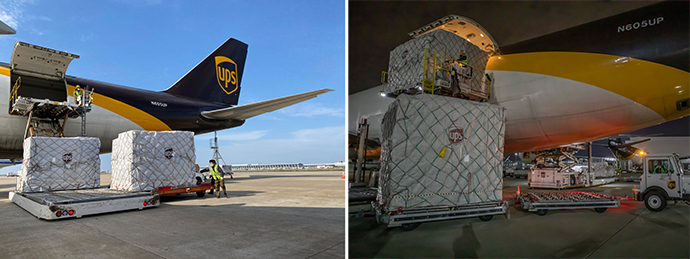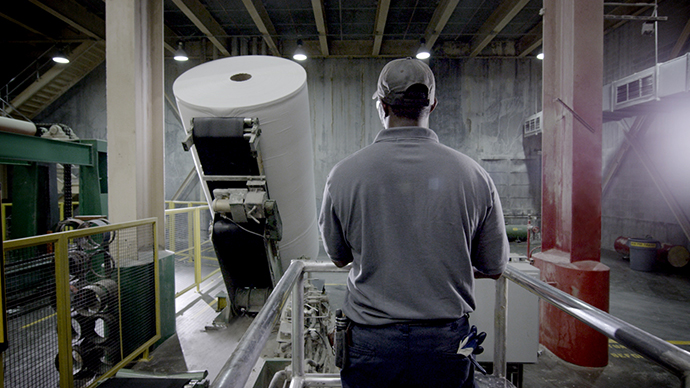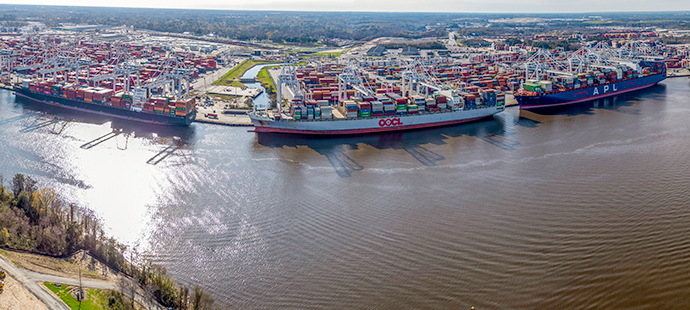Just because your state has the No. 1-ranked business climate, it doesn’t mean you’re going to escape the consequences of COVID-19 and its corresponding economic earthquake.

Just ask Chris Clark, president and CEO of the Georgia Chamber. While he represents the business community of the state ranked No. 1 in overall business climate by Site Selection for seven years running, he’s scrambling around the clock now to keep the lights on at Georgia companies and preserve the jobs of their workers.
“No two days are the same,” he said this week from his temporary home office in Atlanta. “This virus and the recession it’s bringing on are changing every day. I basically spend all day now trying to help my members — and it’s a moving target. About 36% of Georgia businesses told us last week that they had already experienced business interruptions, shutdowns or closures, and that percentage continues to go up. About 80 to 90% of all our businesses have had some type of operational change.”
Against this backdrop, I interviewed Clark on Wednesday to take the pulse of the current economic crisis in Georgia and to find out what plans are being made for an eventual recovery.
What are some of the biggest needs you are hearing about from businesses around the state?
CLARK: Most fall into one of two categories. Either they’re just trying to understand how to operate in a shelter-in-place environment and keep their employees safe, or they’re asking how they can apply for disaster relief loans and the Paycheck Protection Program through the SBA. We are directing people to other lenders if their bank is already out of money. Literally a hundred or more banks around Georgia are available to help small businesses, and there will be more resources coming online soon from the Georgia General Assembly.
“Different sectors are going to recover in different timelines. Manufacturing can be back to full production in 30 to 60 days. Other businesses may take a year or more to recover, if everything goes right.”
What are some of the hardest hit industries in Georgia?
CLARK: Obviously, the hardest hit right now is the second largest industry in Georgia — tourism and hospitality. Many Georgia businesses rely on trade shows and conventions, beaches and attractions, festivals and concerts, and other hospitality-related activities for their livelihood. All that is shut down and likely will be for some time. We canceled our big spring meeting of 300 members. The Masters has been postponed. The Atlanta Hawks should be playing now. The WNBA and Atlanta United should be playing. On top of that, this is the prime time of year for people to buy houses. People aren’t buying houses now because of the economic uncertainty.
Global Bridges

Among the Georgia-based companies rising to the occasion in the COVID-19 crisis is UPS, which is managing and brokering 25 flights over the next two weeks in support of Project Airbridge, a coordinated effort among the Federal Emergency Management Agency (FEMA), numerous countries and the private sector designed to expedite the arrival of critical supplies needed in U.S. hospitals.
Project Airbridge flights are delivering more than 3 million pounds of materials — including masks, surgical gowns, gloves, medical swabs and thermometers — in high demand within the U.S. healthcare system. Shipments are originating from China (daytime loading photo), Malaysia and Honduras, among other countries. UPS also has opened a new 450,000-sq.-ft. UPS Healthcare facility at its Worldport site in Louisville, Kentucky (nighttime unloading photo) with dedicated space for FEMA.
How bad have things gotten for the restaurant sector?
CLARK: We’ve heard from numerous restaurant association members. They’ve called to say they just can’t manage right now. Landlords are giving some grace on rent, but they’re applying for disaster relief loans. A fairly high number of business failures have occurred in this sector already. Large companies say they’re doing everything they can to focus on their employees first. They’ve been good in getting their lines of credit early.
Which industries and companies are seeing the biggest hiring boom now?
CLARK: Publix, Kroger, Walmart, the Georgia Ports, Amazon, and pretty much anyone in logistics. They have all stepped up and recognized the role they play in this. Those large essential service businesses are mobilizing to respond. Clorox has a big plant in Georgia. They have gone to round-the-clock shifts. We will see an uptick in more logistics hiring.
Is anything being done to redirect displaced workers to any of these new job openings?
CLARK: Yes. Mark Butler is our state’s Department of Labor Commissioner. His office is overwhelmed with unemployment claims right now, buy they’re addressing this need. There is a unique opportunity here for us to go into the future. Half of the jobs today won’t even be jobs in five to 10 years. The challenge is, how do you get those people prepared for higher skilled jobs? This crisis will expedite the elimination of lower skilled jobs. The DOL Commissioner is working to make those connections. Even he is trying to hire more people in this time.
“Clorox has a big plant in Georgia. They have gone to round-the-clock shifts … We will see an uptick in more logistics hiring.”
What are the projections for when a possible economic recovery will take place?
CLARK: Most experts think this will be at least a mid-term downturn for the U.S. economy. The good news is that Georgia is in a different position today than we were a decade ago. We’ve drastically overhauled our business climate and we will come back faster this time.
What will be most needed to facilitate the recovery?
CLARK: Businesses will need a safety component. People will need to feel safe. Secondly, we will need access to capital. Most believe that five to six months of relief will be necessary. Businesses will be looking for what signals the federal government is sending with the stimulus. With the Phase 4 bill, it’s important that investment in infrastructure be in there. We are fully behind President Trump’s call for significant infrastructure investment. We’ll also need to jumpstart homebuilding, and the business community will need the confidence to invest again.
 “We are shipping out product as fast as we can make it. Our tissue manufacturing facilities are operating 24/7 and our employees are doing all they can to serve our customers and meet consumers’ needs during this situation.”
“We are shipping out product as fast as we can make it. Our tissue manufacturing facilities are operating 24/7 and our employees are doing all they can to serve our customers and meet consumers’ needs during this situation.”
How long do you expect it to take for most Georgia businesses to recover?
CLARK: Different sectors are going to recover in different timelines. Manufacturing can be back to full production in 30 to 60 days. Other businesses may take a year or more to recover, if everything goes right. We need to be cautious that we don’t have a phase 2 or phase 3 pandemic. We want to avoid what happened in the U.S. in 1958. In late winter and early spring of that year, a horrible flu pandemic basically shut down the country. Another round hit America in the fall and a third round the next winter. America went through a pandemic three times. This time, it is essential that we minimize the impact of a reoccurrence.
“This crisis will expedite the elimination of lower skilled jobs.”
Has the Georgia Chamber been working on drafting a roadmap to recovery?
CLARK: We’ve been working on a roadmap to recovery for Georgia since the end of February. Georgia was in the bottom of the recession in 2010 when Nathan Deal became governor. Over the next three years, we passed over 30 bills to improve the Georgia business climate. We’re looking at what we did then to see what we can do now to jumpstart and accelerate recovery for Georgia when things return to normal. We’ve asked industry associations around the state to shift their policy advocacy toward recovery. Next week, we will release a white paper on policies needed at the state and federal level to facilitate economic recovery. I’ve asked our staff and our members to think about the systemic issues that were already in our economy before this pandemic crisis. Housing was one of them. Is there an opportunity to jumpstart low and middle-income housing starts? This can have long-term relevance and be a major contributor to economic recovery across Georgia and the nation.
How have Georgians responded overall?
CLARK: Amazingly. Our farmers are struggling to find workers to harvest their vegetable crops right now, but I really don’t hear people complaining. You don’t get people bellyaching. Everyone is rolling up their sleeves and doing whatever they can to weather this storm. Georgia will come back from this.

